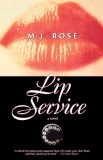Summary | Excerpt | Reviews | Readalikes | Genres & Themes | Author Bio

Across the table, Paul noticed no one was talking to Tom Foley and, excusing himself from Georgia Menken, he walked around to our side.
Not knowing what had transpired, Paul couldn't have avoided what followed.
"Jill, Tom, I wanted to make sure you two got a chance to talk to Sam Butterfield. He's one of our most fervent supporters. Over the last three years, he's employed several of our graduates."
Jill remained aloof, but Tom was interested.
"In fact, we just promoted one of your graduates to be our assistant librarian," Sam said.
"There's great satisfaction in active participation," Tom said. "Anyone can just write a check. What kind of company do you have, Sam?"
Assuming Tom and his wife shared similar prejudices, I tried to warn Paul to intervene, but my husband wasn't paying attention to me -- he was absorbed in getting the two men to bond.
"Sam is the founder of the Butterfield Institute," Paul boasted, adding, "In the psychiatric community, it's considered the finest clinic of its kind."
"The Butterfield Institute? Sorry, I don't think I'm aware of it," Tom said.
"It's that progressive sex clinic, Tom," Jill said, as if she'd just eaten spoiled food.
Immediately, Paul changed the subject back to FIT and they continued conversing about the charity until the waiter interrupted with the next course.
"Oh well, I suppose that will put an end to Paul's trotting me out to impress new devotees for a while," Sam said to me in a low voice once Paul had returned to his seat. Jill had turned her full attention to the man on her left and Tom was busy with the dinner partner on his right.
"Perhaps we should play it safe and talk about something innocuous in case anyone's eavesdropping," I joked.
"All right. What do you know about poetry?" Sam asked.
"Sorry -- I haven't read any since college."
"Did you ever hear of the poet Robert Herrick?"
I sipped some wine and tried to remember. "I think so. Was he a nineteenth-century English poet?"
"Seventeenth. He had a mistress to whom he wrote reams of poetry." Sam paused. "Her name was Julia. One of the better-known poems is called "Upon Julia's Clothes." Do you know it?"
"No."
Sam shut his eyes and let his head fall back a bit. Slightly too suggestive for the time and place. I looked over at Paul, but he was engrossed in conversation.
"'Whenas in silks my Julia goes
Then, then (methinks) how sweetly flows
That liquefaction of her clothes.
Next when I cast mine eyes, and see
That brave vibration each way free,
O how that glittering taketh me!'"
Sam opened his eyes and looked at me, awaiting a response.
"That was beautiful," I whispered, half enthralled, half embarrassed by his expansiveness.
"You mean you never had a lover read that to you?"
I shook my head no.
"Fucking shame. It was written over three hundred years ago, but it fits you -- especially tonight. There's a beautiful tradition in quoting love poetry. It's a powerful and underrated aphrodisiac."
The setting for Sam's sentiment was perfect. Victorian conservatories had often been used as trysting places where lovers met and read poetry to express emotions both were too shy to speak directly. But considering the occasion, Sam's comments were inappropriate.
Because I was on my best behavior, I was able to appear composed. But his flirting had unnerved me.
I reminded myself that a good therapist has the ability to instantly connect to a patient. It was a gift I'd seen firsthand with my father, with Dr. Maggie Stone, who was my therapist, and with my husband. Now, I tried to convince myself that that was all Sam had done with me. But when he'd recited those lines I'd become aware of the thin fabric of my dress against my body. I'd felt my skin flush; my nipples harden. How long had it been since a man had made me aware of myself?
Copyright © 1998 by M.J. Rose
Your guide toexceptional books
BookBrowse seeks out and recommends the best in contemporary fiction and nonfiction—books that not only engage and entertain but also deepen our understanding of ourselves and the world around us.